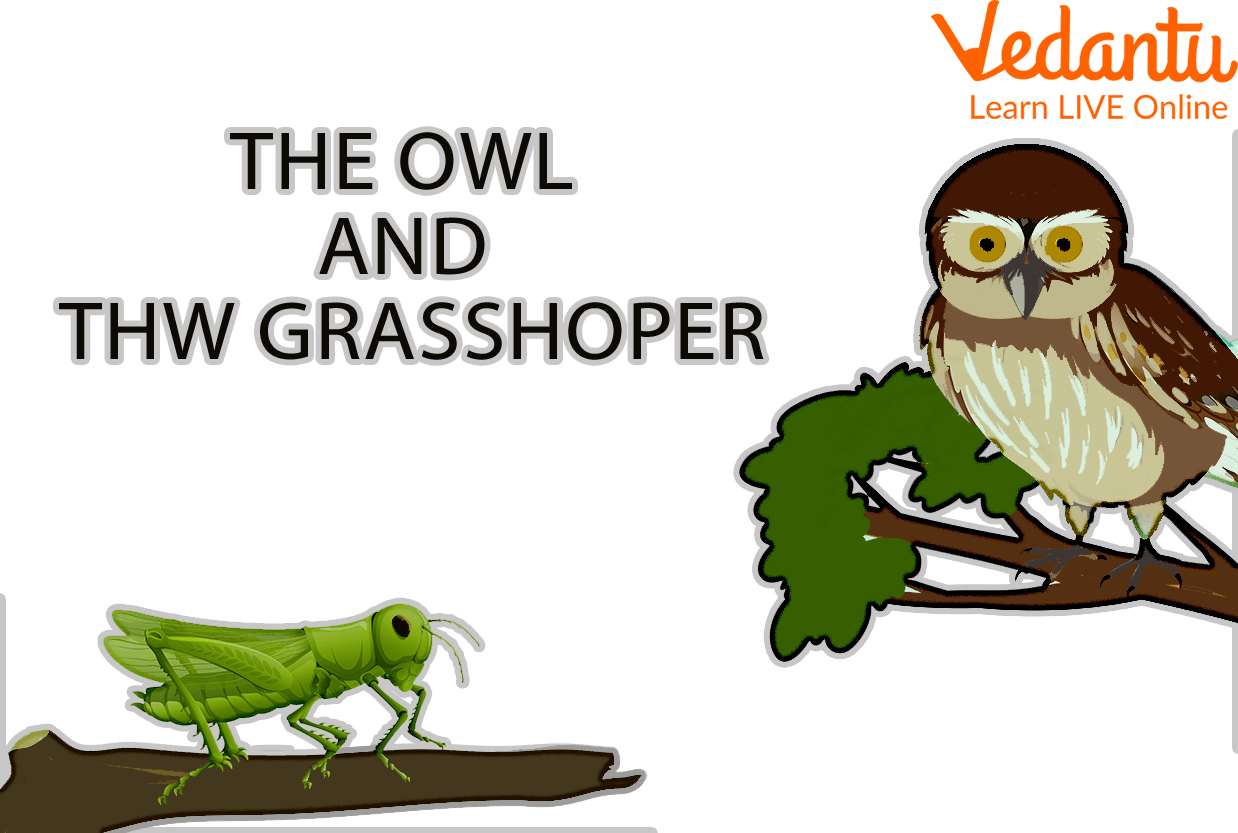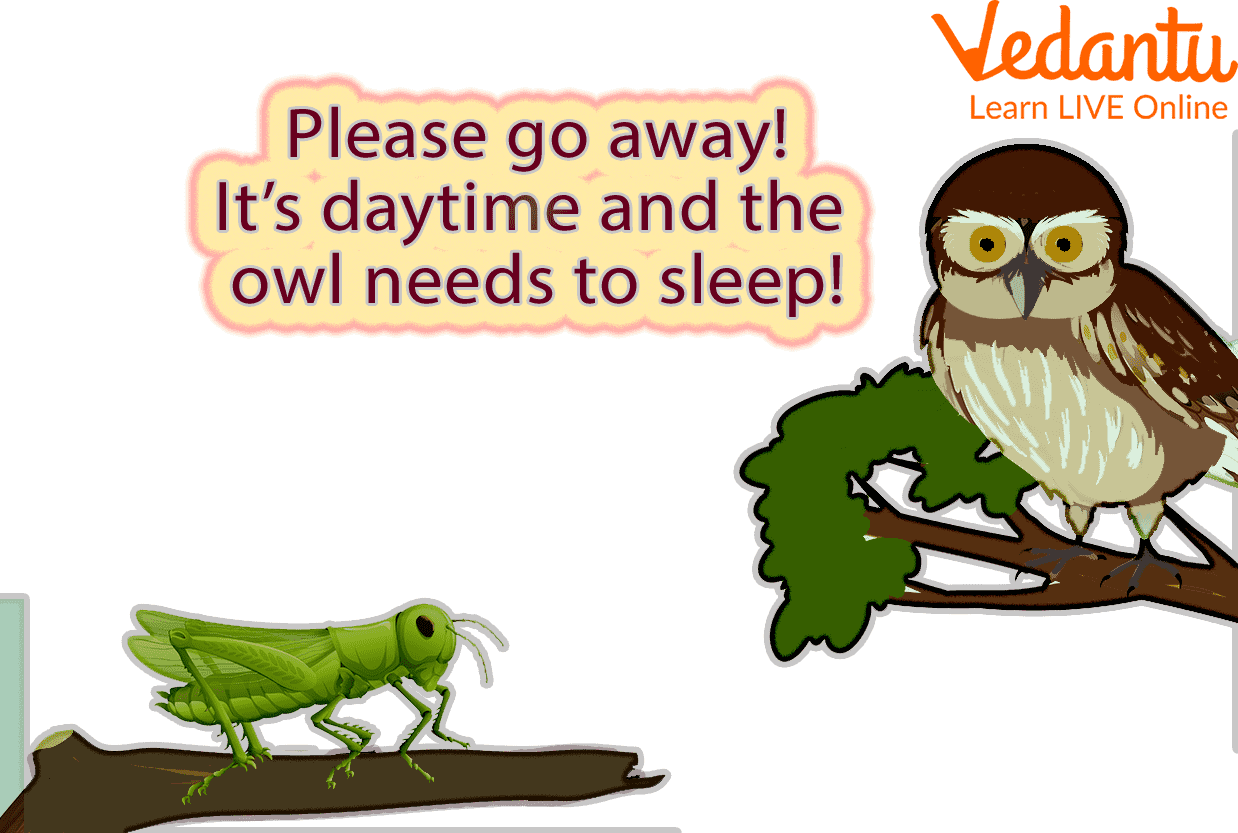The Owl and The Grasshopper Story

Introduction to The Owl and The Grasshopper Story
One of Aesop's fables is about the owl and the grasshopper. Greek fabulist and storyteller Aesop is credited with creating several fables that have come to be known as Aesop's Fables.

The Owl And The Grasshopper
Aesop's Fables is a collection of fables referred to the storyteller Aesop, who is thought to have lived in ancient Greece between 620 and 564 BCE. His name is connected to a variety of original stories that also exist in modern times. These stories are still being reinterpreted in popular and artistic media and in various languages.
The Story
An owl who always slept during the day once lived in a faraway land. She then rises up from the old hollow tree, flapping and blinking, as darkness falls, the rosy light fading from the sky and the shadows creeping slowly through the wood. She starts looking for the bugs and beetles, frogs, and mice she enjoys eating by letting out a strange "hoo-hoo-hoo-oo-oo" sound that echoes through the quiet wood.
There was an elderly owl who, as she got older, grew very easily irritated and was difficult to please, especially if anything disturbed her regular sleep. A grasshopper nearby started singing joyfully but raspily one warm summer afternoon as she tried to sleep off in her den in the old oak tree. The elderly owl's head suddenly appeared from the tree's opening, which served as both her door and window.

The Owl Requesting the Grasshopper to Leave
She tried to address the Grasshopper, saying, "Get out of here, sir." "You lack manners, do you? Leaving me alone to sleep in peace would at least show respect for my age."
However, the Grasshopper replied by saying he had just as much of a right to his spot in the sun as the Owl did to hers in the ancient oak. He then began playing a louder, still more growly voice tune.
The old sage Owl understood very well that arguing with the Grasshopper—or anyone else, for that matter—would not be beneficial. In addition, her eyes were too dull during the day for her to punish the Grasshopper fairly. She then decided to abandon all harsh language and spoke to him in a very kind manner.
"Well, sir, if I have to stay up, I'll just settle in to listen to your singing, she said. Now that I think about it, I have some wonderful wine that was sent to me from Olympus and that I've been told Apollo drinks before he sings to the high gods. I would appreciate it if you would join me in tasting this delicious drink. You'll start singing like Apollo; I'm positively sure."
The foolish Grasshopper was fooled by the Owl's flattering comments. He jumped up and ran to the owl's den. However, when he was close enough for the old owl to see him clearly, she pounced on him and consumed him.
Summary
The main moral of the story is to be prepared for the future as if it were present gratitude. It's not about how we are in the present moment but how we plan for what will come. The grasshopper was living in the moment and enjoying his time with food and drink while he could, treating time like a commodity that lasted forever.
In contrast, the wise owl saw a storm coming, which would leave her without shelter or food. So she got busy gathering supplies and building an elaborate nest to get herself ready for winter ahead of time. So, as night came upon them, she had her dinner while sitting comfortably in her warm nest, watched over by owls who sang sweetly through the dark hours of the night.
The owl and the grasshopper story says that flattery is not a true indication of admiration, so we shouldn’t get fooled by anyone else, letting flattery make you forget about an enemy.


FAQs on The Owl and The Grasshopper Story
1. How did the owl feel about the grasshopper singing?
The noise of a grasshopper greatly disturbed an owl, who was used to eating at night and sleeping during the day. He genuinely requested the grasshopper to stop chirping. The more the owl begged the grasshopper to stop, the louder the grasshopper chirped.
2. How did flattery make the grasshopper forget about its enemy?
The Grasshopper was fooled by the Owl's flattering comments. He jumped up and ran to the owl's den, but as soon as he was close enough for the old owl to see him clearly, she pounced on him and consumed him.
3. What is the lesson of the Owl and the Grasshopper story?
The story of the owl and the grasshopper is one of Aesop's fables. A grasshopper woke up an owl who was trying to sleep. The more the owl complained, the louder the grasshopper sang. The story's lesson is that flattery does not always represent genuine admiration. So, do not allow flattery to make you forget about an enemy.
4. What lesson can we learn from the fables?
Fables are recognised for their moral lessons. These short stories were once passed down as folklore to teach listeners the difference between right and wrong, to offer guidance on appropriate behavior and manners, and to provide life lessons.




